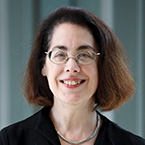
Arlene Sharpe M.D. Ph.D. is the George Fabyan Professor of Comparative Pathology, Head of the Division of Immunology, and Interim Co-Chair of the Department of Microbiology and Immunobiology at Harvard Medical School. She is a member of the Department of Pathology at Brigham and Women’s Hospital, an Associate Member at the Broad Institute of MIT and Harvard, and Leader of the Cancer Immunology Program at the Dana-Farber/Harvard Cancer Center. Dr. Sharpe is the Co-Director of the Evergrande Center for Immunologic Diseases at Harvard Medical School and Brigham and Women’s Hospital.
Dr. Sharpe earned her A.B. from Harvard University and her M.D. and Ph.D. degrees from Harvard Medical School. She completed residency training in Pathology at Brigham and Women’s Hospital and is board certified in Anatomic Pathology. Dr. Sharpe has served as a member and chair of the NIH Hypersensitivity, Autoimmunity and Immune-mediated diseases (HAI) study section and is currently a member of NIAID Council. She is also the President of the American Association of Immunologists.
Dr. Sharpe is a leader in the field of T cell costimulation, and investigates how costimulatory pathways regulate immune responses. Her laboratory has discovered and elucidated the functions of T cell costimulatory pathways, including the immunoinhibitory functions of the CTLA-4 and PD-1 pathways, which have become exceptionally promising targets for cancer immunotherapy. Her laboratory currently focuses on the roles of T cell costimulatory pathways in regulating T cell tolerance and effective antimicrobial and antitumor immunity. Her laboratory is also involved in studies aimed at translating the fundamental understanding of T cell costimulation into new therapies for autoimmune diseases and cancer. Dr. Sharpe has published over 300 papers and was listed by Thomas Reuters as one of the most Highly Cited Researchers (top 1%) in 2014 and 2015 and a 2016 Citation Laureate. She received the William B. Coley Award for Distinguished Research in Tumor Immunology in 2014 for her contributions to the discovery of the PD-1 pathway.